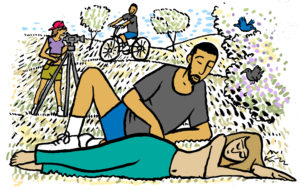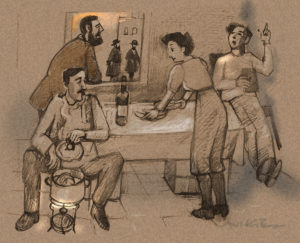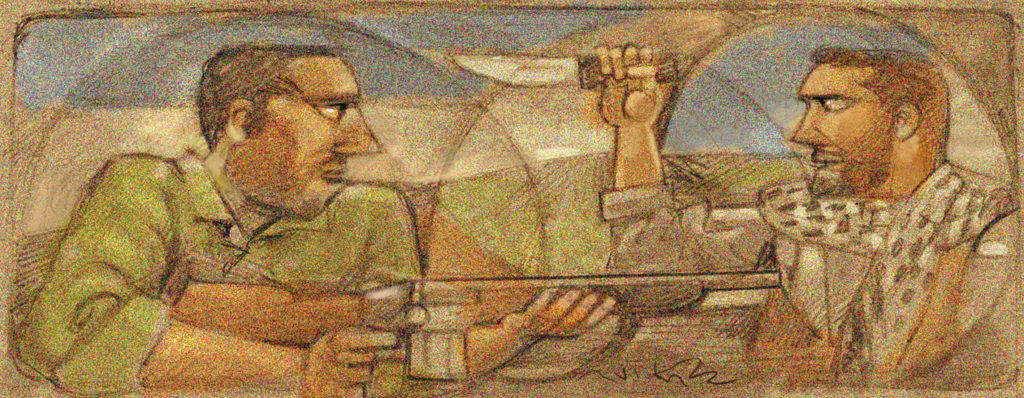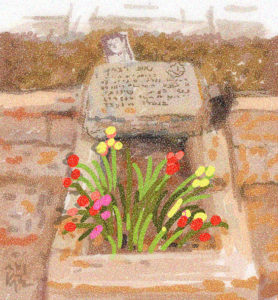Haim Watzman

I long ago stopped believing myself. Stopped believing the Rosary Sisters and Father Joaquin and Ismail Haniyeh and Abu Mazen and the pope and my own thoughts. Nasrin, the only thing you believe in is the sea, Mama screamed at me when my brothers found me on the beach instead of in class with the Sisters. Because, I screamed back, it’s where Gaza ends and the world begins. But I could never put even my foot in the water.
Our names were right. I was a lonely flower, Dima was a downpour. By the time she was fourteen she was climbing out of the bathroom window at the Rosary Sisters, shouting herself hoarse at demonstrations that no one heard, attending political meetings that no one cared about. When I raised the subject, she shouted at me about Israeli imperialism and European colonialism and patriarchal oppression. What does a girl with no father know about patriarchal oppression, I countered, trying to make a joke. But jokes only work if there’s a real world to joke about.
The Rosary Sisters taught a great deal, but I learned very little. I had no use for incarnations and visitations and transubstantiations, for a miracle’s only a miracle if you live in a world that operates according to laws and logic. Then a miracle can startle you out of the natural routine and give you a glimpse of something beyond. But in Gaza, where sewage runs down the street and your fridge operates just a few hours a day and where a brother or two, bored and distracted and unmanned by inaction and unemployment, beats you at incoherent intervals for no reason at all, there are no laws, so there can be no miracles.
Culture and Ideas
In Defense of Avi Katz, I Resign from the Jerusalem Report
Haim Watzman The editor of The Jerusalem Report, Steve Linde, has dismissed the magazine’s long-time illustrator, Avi Katz. Readers of South Jerusalem are well-acquainted with Avi’s illustrations for my Necessary Stories, but Avi also produced an editorial cartoon for each issue of the magazine. As editorial cartoons are supposed to do, they angered some readers. … Read more
Off Gaza — “Necessary Stories” from The Jerusalem Report
Haim Watzman
Ido and I are starting on our second beer on a Monday night at Carousela on Mitudela, just off Gaza, when this old guy comes off the crosswalk, sits down at the table next to us, and begins to cry.
Ido turns and stares. It’s the second weird thing that’s happened since we took our regular spot on the patio to shoot bull and brainstorm our latest project, which is still in the cloudy stage but has, we’re sure of it, incredible potential to turn two part-time art students who met last year on their post-army South American trek into the Next Big Thing.

“Gavriel, he’s crying,” Ido says, too loudly.
Ido’s got talent, but he can be a pain. Says whatever’s on his mind, no filters. I put my hand up in a vertical salute, just by my left eye, to indicate blinders. “What do you think about putting up a strobe light under Ubinas and a mirror under Lake Salinas?” I suggest, referring to our multimedia sculpture, in which we will abstractly portray this newly awakened Peruvian volcano and adjacent salt lake with compostable materials as a metaphor for the bitterness and ecstasy of life and love. We’re not sure whether the volcano represents life and the salt lake love, or the other way around, but that will come, that will come.
Ido doesn’t take the hint. His first beer always gives him a double buzz. So he leans over, puts his arm around the old guy’s shoulder, and asks him what’s wrong. I don’t have time for this.
The guy is old, but how old? Sixty? Seventy? More? He’s got a fringe of white and brown hair surrounding a bald pate and a face that looks weathered and tired. But he straightens his gaunt torso as Lily, the waitress, complaining that she’s been literally run off her feet
Gazing at Iris — “Necessary Stories” from The Jerusalem Report
Haim Watzman

Yehoshua had passed this spot a few days earlier while riding his bike to his student waiter job at Tmol Shilshom. He spotted a pair of lovers on the peak of the hill, the girl lying on her back, sleeping peacefully, and the guy seated, leaning on his left arm, gazing at her face. A few minutes after passing, as he approached the restaurant, he circled back to the park to observe them again. The guy, with his short black beard and loose tee-shirt, could have been him. And the girl, in her loose trousers, with light brown hair splayed over the grass, could have been Iris. The guy was still gazing, the girl still dozing, and it seemed to Yehoshua that there, on that knoll, amid the purple flowers and shining dark birds, love was as pure as it ever could be. The sour face from the shift manager for being a few minutes late didn’t faze him. He would bring Iris to that spot on Shabbat, and they would be in love like that.
“What are you doing?” Iris asks, one eye still closed.
He smiles. “Gazing at you.”
“Well, stop it. It makes me nervous.” She closes her open eye. After a minute she opens it again. “I said stop it.”
“But you’re so amazing,” Yehoshua says, his whole heart in it. “How can I stop looking?”
She smiles, opens her other eye, and pushes herself up on her elbows. “What’s gotten into you?”
He’s not sure what the right answer is. He thinks back to that other guy and girl. He hadn’t heard them speak. It seemed they didn’t need to.
“I’m being romantic.”
Four Waterfalls, One Hidden — “Necessary Stories” from The Jerusalem Report
Haim Watzman

On to the down-home bargain hotel in shabby-to-slummy Tiberias, where we will spend the long second weekend of Pesach. From our window we have a view, not of Lake Kinneret, but of the rubbish-filled yards of abandoned buildings up the street, and the lonely olive trees that dot the mountain slopes between the upper city’s housing-project neighborhoods.
The next morning, Thursday, the eve of the holiday, we continue north, as far north as we can go, to Metula. We take a right at the gate, then turn right again and again to reach the entrance to the Ayun Reserve. A stream of that name wells up a bit further north, in Marjayoun—I saw it three and a half decades ago, when I shuttled through the town time and again as a soldier serving unenthusiastically in Lebanon. When it crosses the Israeli border, it enters a narrow canyon and spills down a steep series of waterfalls, into the Hula Valley. Thirteen years ago the stream dried up, when Hezbollah diverted the source springs in the Lebanese town to irrigate the fields nearby. A few years ago, the Israel Nature and Parks Authority brought the stream back to life by piping in water from the Dan, a mightier stream to the southeast. Dan and Ayun, along with Hatzbani and Banyas, are the four headwaters of the Jordan, fed by melted snow from Mt. Hermon filtered through limestone strata laid down by primordial seas and pushed up by ancient cataclysms.
Seven years ago, on this holiday, our son died. Niot, our third headwater, was like a stream. He bubbled up, burbled, flowed over rapids, made all around him green and alive. Year round, year by year, for twenty years.
On This Side and That — “Necessary Stories” from The Jerusalem Report
Haim Watzman

“It is a heavenly chicken,” he pronounced. “There is no pleasure on this earth greater than inhaling the scent of a cooking chicken.”
“How about an orgasm?” suggested Yanai, tipped back against a corner with his legs stretched out, dressed in a white shirt and paint-splattered work pants. The corner went dim as the final ray of the setting sun abandoned the window of Devorah Hannah’s room in Jerusalem’s Fruits of Labor neighborhood. Behind the aroma of the cooking chicken was a dank scent of mildew, brought on an hour before by a cloudburst that had come two weeks too early on that Yom Kippur eve of 1911.
“All great orgasms are, ultimately, alike,” Zealot considered, preening his moustache, “but each excellent repast is excellent in its own way.”
“Zealot has never had either,” Devorah Hannah informed Eliezer, as she set her table for four. The table was the board that served as her bed, with an additional crate added to each leg, with a white cotton sheet serving as a tablecloth. A bottle of Rishon Letzion was already open and waiting. Eliezer gazed out the window at men in black frock coats and black hats striding toward synagogues. He wore the brown gabardine suit that he generally put on only for his meetings with Ottoman officials or Baron Rothschild’s men.
“I can’t read any more,” Yanai sighed, putting down his copy of Brenner’s new novel, On This Side and That.
“Too dark?” Eliezer asked.
“The darkness of the soul,” Yanai said, slowly rising, then pushing the rickety chair toward the table. He stretched his lanky frame and yawned. “When do we eat?”
Paper Rule — “Necessary Stories” from The Jerusalem Report
Haim Watzman

As I rant, her face is forbearing but firm. She holds her pile of folded laundry perfectly steady. My tirade is just a fraction of the pre-Shabbat uproar of tantrums, whistling kettle, beeping microwave, high-volume radio, chair-dragging, clinking plates and silverware that fill my big sister’s small apartment. I take a deep breath in the middle of a loud sentence.
Itay, Steph’s five-year-old (number four of six) walks out of the boys’ room and stares at me. I put my hand on the lintel of the bathroom door ‒ to steady my spirit more than to hold up my body. Maybe I should leave before the rules kick in. But where would I go? Back home to Mom would be worse. Back on the road?
“I’m sorry,” I say. “Of course. It’s your place. I get it. It’s a rule.”
Steph smiles, hugs me, then holds me by the shoulders and looks at me like she used to when I’d come home from school with holes in my jeans that Mom hadn’t yet seen.
“Little sis. I love you.”
Itay reaches up between us to see who will respond first. I pick him up and give him a squeeze.
“Can I just have on record that I think, that of all the Shabbat rules you’ve so carefully laid out and explained over the last hour, this is the most ridiculous?”
The Shirt Off His Back — “Necessary Stories” from The Jerusalem Report
Haim Watzman
Itzik feels a little hand tugging at his but keeps his eye on the shirt. The hand belongs to Lior, his three-year-old. The shirt belongs to him, to Itzik, but Itzik is not wearing it. A stranger is.

The shirt is purple, long-sleeved, one that Itzik would never have worn on such a hot summer morning. The stranger wearing it has a sculpted, lean face and sits poised, erect but relaxed. Other than the shirt, he has on khaki cargo shorts and New Balances.
“Abba, watch,” Lior pleads, tugging again at Itzik’s hand. Itzik looks down into his son’s bright eyes, which seem to take up most of his face.
“I’m watching, I’m watching!” Lior smiles broadly, but when he sits down on the edge of the slide, his face clouds.
“Go on!”
Lior shakes his head slowly, turning it a full ninety degrees each way.
“Ok, I’ll go catch you.” Itzik clambers down the ladder and goes to the bottom of the S-shaped slide, a tunnel at its top half. Lior lets loose with a child’s primal cry and a few seconds later lands on his bottom on the rubber below. Lior screams, more insulted than hurt. Itzik looks away from the stranger, heaves his son up into a big hug. The stranger looks up at them.
One Flesh — “Necessary Stories” from The Jerusalem Report
Haim Watzman
We circle, weapons drawn, two as one, ready to kill.
I raped the boy in April 1948, in a dark corner in the garden of a villa in Talbieh. A few minutes before he had leapt out from between some bushes, a butcher’s knife flashing. Boaz, a pace away from me, had his eye on the balcony above, fearing a sniper, so he never saw the kid who brought the knife down between his shoulder blades, with a shout of Allah akbar!, or perhaps it was something else. The stars were just coming out, but I saw my friend murdered. I saw the blood spurt from his back and chest as he crumpled.

To this day I wonder how, in the heat of battle, I could have been able to grasp that I was gazing at a face of godlike beauty. I had always assumed beforehand—and, indeed, all my experience since then has confirmed—that when your life is on the line, when you stand on the precipice between life and death, the mind focuses only on keeping you alive. Your eye takes in every detail of the terrain, every clue to where your enemy lies, but nothing of the harmony of the shape of the landscape. Color may be a sign of danger but never moves the heart. Yet, at this instant of vengeance I was nearly unnerved by the splendor that I saw.
Roadblock — “Necessary Stories” from The Jerusalem Report
Haim Watzman

Guy threw his rifle onto the bunk below and began unbuttoning his shirt.
Alon froze in the middle of pulling his pants up. Guy stopped unbuttoning and stared at his friend.
“I switched with Rafi,” he whispered, so as not to wake sleeping men. He pointed his chin at the reservist lacing boots on the next bottom bunk across the fusty barracks room and over one. His head then signaled to the left, at another man who was already down to his underwear and holding a towel. “Did the ten o’clock shift with Uriel instead.”
Alon was wordless for a moment and then, almost inaudible, said: “Shit, Guy.”
Third Day of Spring — “Necessary Stories” from The Jerusalem Report
Haim Watzman
The third day of spring is warm in the sun but cold in the shade. Ilana and I take the day off to head south and see lupines and anemones blanket green hills. But first we have a stop to make. We drive to the Botanical Gardens at Givat Ram for lunch at the café, and then buy flowers to plant at Niot’s grave.

On Niot’s plot, the flowers Ilana planted last year are blooming again, but the stems have grown long and tangled and tough. We try to put at least some of them in order, but realize that they have gone feral and will no longer bow to our will. Not to mention, there were some other brightly colored flowers there, which might have been poisonous flowers, so we dig them all up to replace them with young, soft newcomers, bearing petals of many colors. The sun is warm and I take off my sweater.
We do not speak much. We do not need to; lovers of many years know each other’s minds, and for the last six years we have been tied fast to each other not only by love but also by grief, and intense longing that often knows no words.
The Madonna Lily — “Necessary Stories” from The Jerusalem Report
Haim Watzman

I make a mental note to consider an essay arguing that Einstein drafted his theory of Special Relativity in these corridors; I notice that as I try to pick up my pace, the carry-on I pull behind me and the laptop on my back gain mass, and the clock on my phone slows down. Yet, according to the signs, I am no closer to Concourse C than when I started out. Then, like Bilbo Baggins catching sight of the Last Homely House, I spy, just off the corridor I am tramping through, an alcove thoughtfully provided by the mad architect who designed this distended monstrosity. The alcove is furnished with a hub of what look like beach chairs set on low pedestals and upholstered in imitation leather. It is silent and empty, and the thought of being able to recline at an angle of less than seventy-five degrees is more salaciously tempting than anything else I have seen this morning. I’m an organized person and my travel philosophy is always get to my gate first, and then rest, but I have so much time that there seems to be no reason not to stop for a brief nap. So I choose a chair that faces away from the corridor, place my carry-on underneath and my backpack for a pillow, and lie down. Out of the corner of my eye, I notice, on the next chair over, the long stem and closed buds of what we call in Hebrew a shoshan tzahor. It makes no impression. I quickly lose consciousness, and when I come to, I scream.





